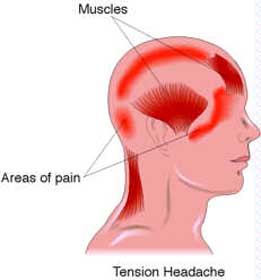Sinus headache is a medical condition characterized by severe pain in the forehead and the cheekbones. It is basically a symptom of sinus infection, which is caused due to the overflow of mucus and air in the paranasal sinuses (the hollow spaces behind our eyes and cheekbones). Excess mucus secretion is a part of our body’s defense against irritation by various allergens and/or viral infection. Sinus headache is primarily associated with acute sinus infections. The throbbing pain, ranging between mild and severe, may persist for a week or sometimes even more. The headache is known to cause utter discomfort to the individual experiencing it, and the best way to get relief from this discomfort is to initiate sinus headache remedies as soon as headache symptoms start surfacing.

Sinus Migraine Headache and Tension Headache Remedies
There does exist some natural methods which can provide sinus headache relief at home. Remedies to relieve sinus headache include cold compress, acupuncture, aromatherapy, etc. Some more simple yet effective sinus headache remedies are given below.
Cold compresses by dipping a towel in cold water and applying it on the forehead helps in easing the pain associated with sinus headache.
It may sound surprising, but eating spicy food also helps in clearing the nasal passage and thus relieving sinus infection and its symptoms.
Expectorants, such as eucalyptus oils, are also effective in clearing the mucous accumulated in the respiratory tract.
A nap for about half an hour in a dark room helps in alleviating the pain associated with sinus headache to a great extent.
One of the best sinus headache remedy is to eat jalapeño pepper, which helps in draining mucous and reducing the pain.
Various head and neck stretches also show desired effects, when it comes to easing the pain in forehead and cheekbones associated with sinus.
These were some simple yet effective sinus headache symptoms remedies, which would not just help in treating sinus headache, but also help in preventing it in the long run.
In case of severe sinus infection, however, you may have to consult a doctor and undergo proper treatment. This treatment procedure shouldn’t be substituted by sinus headache home remedies. More importantly, if you are undergoing sinus headache treatment, you should complete the entire course of medication prescribed by the doctor. Other then these, taking some preventive measures such as avoiding irritants, drinking plenty of fluids, using humidifier and maintaining clean surroundings can also help in keeping sinus infection, as well as sinus All kinds of Headache, at bay.
Sinus Migraine Headache and Tension Headache Management
Pain management involves a variety of techniques and treatments that aim to reduce or alleviate pain. Here are some general pain management strategies:
- Over-the-counter pain relievers: Non-steroidal anti-inflammatory drugs (NSAIDs) such as aspirin, ibuprofen, and naproxen can help alleviate mild to moderate pain.
- Prescription pain medications: Opioids such as morphine, oxycodone, and hydrocodone can be used to treat moderate to severe pain, but they should be used with caution due to their potential for addiction and other side effects.
- Physical therapy: Physical therapy can help relieve pain through exercises and other techniques that strengthen muscles and improve mobility.
- Massage therapy: Massage therapy can help reduce muscle tension and alleviate pain.
- Acupuncture: Acupuncture involves inserting thin needles into specific points on the body to help alleviate pain.
- Chiropractic care: Chiropractic care involves the manipulation of the spine to help alleviate pain and improve mobility.
- Heat and cold therapy: Applying heat or cold to the affected area can help alleviate pain and reduce inflammation.
- Transcutaneous electrical nerve stimulation (TENS): TENS involves the use of a small device that delivers electrical impulses to the affected area to help alleviate pain.
It’s important to note that the best pain management strategy may vary depending on the type and severity of the pain, and a healthcare provider should be consulted for proper diagnosis and treatment.